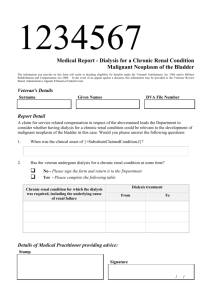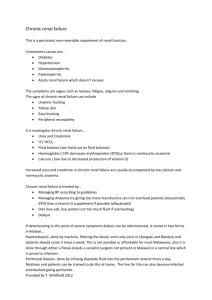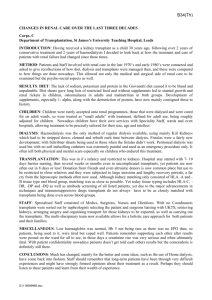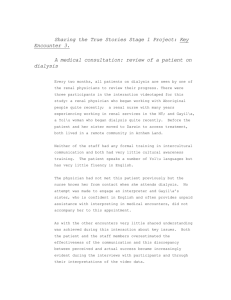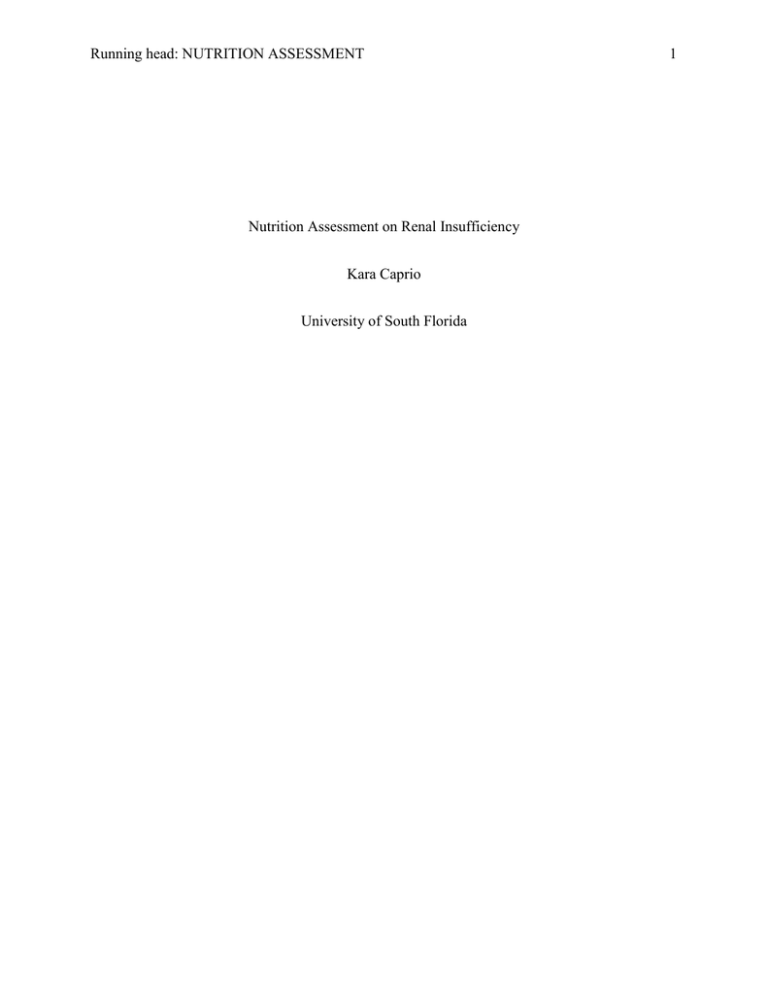
Running head: NUTRITION ASSESSMENT
Nutrition Assessment on Renal Insufficiency
Kara Caprio
University of South Florida
1
NUTRITION ASSESSMENT
2
Nutrition Assessment on Renal Insufficiency
It was Friday morning when I went into work, and like any normal day I sat down at the
computer to get the updates on my patients from the night before. When I looked at the chart I
saw that the doctor had ordered for Mr. Wilson to be discharged later that day. Mr. Wilson has
been newly diagnosed with renal insufficiency, border line chronic renal failure, and was
scheduled for a dialysis consult. Because Mr. Wilson was a newly diagnosed patient I knew I
would have to do some patient teaching concerning his diet, so that he would be aware of how to
take care of his body properly now that he has been diagnosed with renal insufficiency.
I walked into Mr. Wilson’s room to give him the plethora of information I had about
renal disease, I started by asking Mr. Wilson if he knew anything about renal insufficiency, when
he said no I started to explain that the kidneys are very important organs which help keep the
body balanced. I stated that because he has been diagnosed with renal insufficiency his diet is a
crucial aspect in preventing the disease progression and malnutrition. Because dialysis is part of
the patient’s treatment I explained that this as well as the patients current lab values and the
amount of urine produced will aid in making his individualized diet. I explained that in a patient
with renal insufficiency nutritional therapy is used to reduce uremia; which results from the
accumulation of metabolic by-products in the body which are normally excreted by the kidneys,
as well as manage fluid status and provide adequate nutrition. Because protein in the diet has to
do with contributing to uremia a controlled protein diet is recommended, although patients that
have dialysis tend to lose more protein, they are able to consume more protein than those that are
not dialyzed. Most of the protein that is consumed should come from food like meats, poultry
NUTRITION ASSESSMENT
3
and fish. Based on the patients individual needs a dietitian will provide the assessment and
recommend a good diet, however a low potassium diet is important for all renal patients. Without
a potassium restriction blood potassium levels will increase which will lead to cardiac
dysrhythmias and cardiac arrest. Some high potassium food sources that should be avoided are,
bananas, dried fruits like raisins, figs and dates, green leafy vegetables like spinach, dried beans,
peas , lentils, melons, oranges and orange juice, potatoes, tomatoes, whole grains and bran. I
explained to Mr. Wilson that decreased sodium and fluid intake are also important for a renal
patient, patients receiving dialysis who have large amounts of fluid accumulation in between
dialysis treatments can cause medical risks. Weight gain due to fluid should be limited to about
2-3kg. Mr. Wilson then expressed that he was worried that limiting fluid would be tough for him,
but I assured him that different things could be done for thirst such as, mouth rinses, sucking on
candy as well as low potassium fluid choices. In renal patients synthesis of active vitamin D is
diminished, this can cause decreased levels of calcium absorption and can predispose the patient
to bone disease, because of this Calcitriol, an oral supplement of active vitamin D is given.
(Osborn, 2014, p.187-189)
Decreased phosphorus in the diet is also a restriction for a renal
patient, a high level of phosphorus can decrease the calcium level in your blood which can lead
to bone disease. High protein foods are normally also high in phosphorus, because Mr. Wilson is
on dialysis his protein needs are increased, but the patient still needs to choose lower phosphorus
foods. For example instead of milk from animals Mr. Wilson can drink rice milk, instead of ice
cream he can eat sherbet, and instead of whole grain refried grain and white bread is better.
(Mayo Foundation for Medical Education and Research, 2010, p.1)
NUTRITION ASSESSMENT
4
References
Mayo Foundation of Medical Education and Research. (2014). Low-phosphorus diet: Best for
kidney disease? - Mayo Clinic. Retrieved from http://www.mayoclinic.org/food-andnutrition/expert-answers/faq-20058408
Osborn, K. S., Wraa, C. E., & Watson, A. B. (2010). Nutrition. In Medical-surgical nursing:
Preparation for practice (2nd ed., pp. 187,188,189). Upper Saddle River, NJ: Pearson
Prentice Hall.



